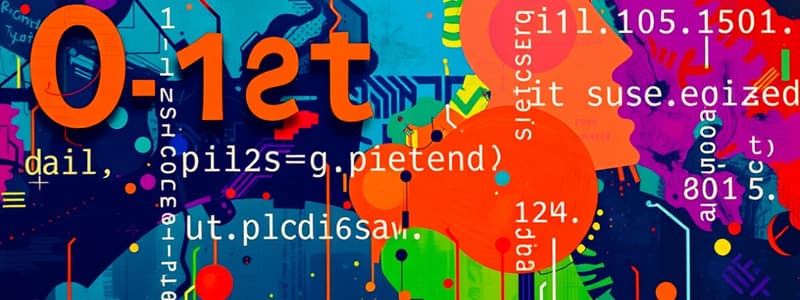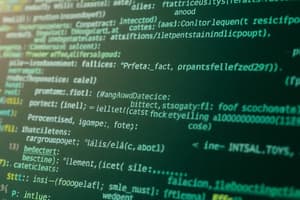Podcast
Questions and Answers
What is the error that results when the number of bits is not enough to hold the number?
What is the error that results when the number of bits is not enough to hold the number?
- Lossless
- Round-off
- Lossy
- Overflow (correct)
What type of error results when the number of bits is not sufficient to represent the actual number?
What type of error results when the number of bits is not sufficient to represent the actual number?
- Lossless
- Overflow
- Round-off (correct)
- Lossy
What does lossy compression mean?
What does lossy compression mean?
- High fidelity
- Preserves all data
- Data is irretrievably lost (correct)
- Good compression (correct)
What does lossless compression allow?
What does lossless compression allow?
What is metadata?
What is metadata?
What is sequencing in programming?
What is sequencing in programming?
What does selection refer to in algorithms?
What does selection refer to in algorithms?
What does iteration mean in programming?
What does iteration mean in programming?
What is reasonable time in terms of algorithm performance?
What is reasonable time in terms of algorithm performance?
What is not reasonable time in algorithmic terms?
What is not reasonable time in algorithmic terms?
What is a heuristic?
What is a heuristic?
What does undecidable refer to?
What does undecidable refer to?
What is a linear search?
What is a linear search?
What is a binary search?
What is a binary search?
What does API stand for?
What does API stand for?
What is citizen science?
What is citizen science?
What is cloud computing?
What is cloud computing?
What is crowdsourcing?
What is crowdsourcing?
What is Creative Commons?
What is Creative Commons?
What is open access?
What is open access?
What is Moore's Law?
What is Moore's Law?
What are peer-to-peer networks?
What are peer-to-peer networks?
What is the digital divide?
What is the digital divide?
What does ISP stand for?
What does ISP stand for?
How does internet communication arrive at its destination?
How does internet communication arrive at its destination?
How can the government control speech on the internet?
How can the government control speech on the internet?
How can internet posters evade conviction for defamation?
How can internet posters evade conviction for defamation?
Flashcards
Overflow
Overflow
Occurs when a computer tries to store a number that is too large for the available memory space. Imagine a car's odometer rolling over.
Round-off
Round-off
A process of approximating numbers due to limited memory space. Like representing pi as 3.14 instead of its infinite digits.
Lossy Compression
Lossy Compression
A type of data compression that discards some data to reduce file size, making it nearly impossible to recover the original completely. Like compressing a JPEG image.
Lossless Compression
Lossless Compression
Signup and view all the flashcards
Metadata
Metadata
Signup and view all the flashcards
Sequencing
Sequencing
Signup and view all the flashcards
Selection
Selection
Signup and view all the flashcards
Iteration
Iteration
Signup and view all the flashcards
Reasonable Time
Reasonable Time
Signup and view all the flashcards
Not Reasonable Time
Not Reasonable Time
Signup and view all the flashcards
Heuristic
Heuristic
Signup and view all the flashcards
Undecidable Problems
Undecidable Problems
Signup and view all the flashcards
Linear Search
Linear Search
Signup and view all the flashcards
Binary Search
Binary Search
Signup and view all the flashcards
API (Application Programming Interface)
API (Application Programming Interface)
Signup and view all the flashcards
Citizen Science
Citizen Science
Signup and view all the flashcards
Cloud Computing
Cloud Computing
Signup and view all the flashcards
Crowdsourcing
Crowdsourcing
Signup and view all the flashcards
Creative Commons
Creative Commons
Signup and view all the flashcards
Open Access
Open Access
Signup and view all the flashcards
Moore's Law
Moore's Law
Signup and view all the flashcards
Peer-to-Peer Networks
Peer-to-Peer Networks
Signup and view all the flashcards
Digital Divide
Digital Divide
Signup and view all the flashcards
ISP (Internet Service Provider)
ISP (Internet Service Provider)
Signup and view all the flashcards
Internet Communication Path
Internet Communication Path
Signup and view all the flashcards
Government Control of Internet Speech
Government Control of Internet Speech
Signup and view all the flashcards
Legal Implications of Internet Posting
Legal Implications of Internet Posting
Signup and view all the flashcards
Study Notes
Important Terms in Computer Science Principles
- Overflow: Occurs when the number of bits is insufficient to hold a number, exemplified by a car's odometer rolling over.
- Round-off: Results from limited bits causing an approximation of numbers, such as representing π as 3.14 with only three digits.
- Lossy Compression: Data compression method that discards some data, making it nearly impossible to restore the original—commonly used in JPEG images.
- Lossless Compression: Preserves all original data during compression, allowing full recovery, typically resulting in less compression efficiency compared to lossy methods, like PNG images.
- Metadata: Descriptive data about other data, such as a camera's settings stored alongside a digital photo.
Code Structures and Algorithms
- Sequencing: A coding structure where instructions are executed in order, similar to how one follows a recipe.
- Selection: Utilizes boolean conditions to choose between two paths in an algorithm, often implemented with if-then statements.
- Iteration: Involves looping constructs like while, for, or repeat-structures to execute code multiple times.
Algorithm Efficiency
- Reasonable Time: Algorithms that operate in polynomial time based on input size in the worst case, indicating manageable growth in execution steps.
- Not Reasonable Time: Characterized by exponential growth in execution steps, such as doubling steps for each additional input element.
Problem-Solving Techniques
- Heuristic: A guiding principle that aids problem-solving, e.g., navigating towards the North Star when lost.
- Undecidable Problems: Extremely complex problems without an algorithmic solution for all inputs, e.g., predicting if a program will halt for any given input.
Searching Algorithms
- Linear Search: Sequential search method where items are checked one at a time, akin to searching for a word in a dictionary.
- Binary Search: A more efficient method that requires a sorted list, repeatedly dividing the list in half to find a target value.
Internet and Computing Concepts
- APIs (Application Programming Interface): Set of rules for how software applications communicate.
- Citizen Science: Involves broad public participation in scientific research, like counting butterflies globally.
- Cloud Computing: Leveraging distributed resources for processing or storage, often used for extensive data management or web applications.
- Crowdsourcing: Gathering assistance from a large online community for tasks like funding projects or analyzing data.
- Creative Commons: Licensing alternative that allows creators to specify terms for sharing and use of their work.
- Open Access: Policy that provides unrestricted access to research and information.
Technological Trends
- Moore's Law: Observation that the number of transistors on a microchip doubles approximately every two years, leading to increased performance.
- Peer-to-Peer Networks: Direct connections between individual computers over the internet, bypassing centralized intermediaries.
- Digital Divide: The disparity in access to digital technologies among different communities or populations.
- ISP (Internet Service Provider): A company providing access to the internet.
Online Communication and Regulation
- Internet Communication Path: Data travels from source to ISP, through the cloud, onto another ISP, and finally to its destination.
- Government Control of Internet Speech:
- Controlling the speaker or their ISP through laws.
- Regulating listener access to certain materials, such as illegal possession of copyrighted content in the U.S.
- Exercising control over intermediaries facilitating communication.
Legal Implications of Internet Posting
- Defamation and Slander Online: Internet users can avoid conviction for slander if certain legal defenses apply, such as proving truth or lack of malicious intent.
Studying That Suits You
Use AI to generate personalized quizzes and flashcards to suit your learning preferences.




